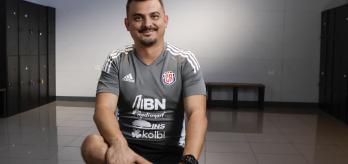Luis Hernández holds a Master’s degree in Psychology and has been working with the Costa Rican FA for 12 years. In this interview with the FIFA Training Centre, he draws on all that experience to explain the difference a good sports psychologist can make to all areas of talent development, from working with elite professionals at major tournaments to making sure vulnerable youngsters can develop in a safe, supportive environment.
Part 1: The role of a sports psychologist
The key job for a sports psychologist on the training pitch is observation – they are looking to understand how players react to different situations and how they communicate with each other. Costa Rica’s sports psychologists also conduct one-to-one interviews with the players, focusing on their family and personal lives, their work outside of football (if they are part-time players), and how they feel about how things are going on the field. They report their findings in writing to the players and the coaches, and these written reports provide the starting point for their clinical work.
Part 2: Psychologists in tournament football
Competitions are always planned carefully in advance, and sports psychologists have a role to play in executing that plan at tournaments. At the same time, though, it is inevitable that unexpected issues will crop up, with the potential to destabilise players and undermine the team’s performance. Sports psychologists are also expected to help players deal with those situations, whether they occur on the pitch or off it. It’s all part of making sure that everyone involved is mentally prepared to deliver their best performance when it counts.
Part 3: The “Five Cs” and promoting leadership skills
When Hernández first joined the Costa Rican FA, he was keen to introduce an approach he had developed called “Five Cs” – Commitment, Confidence, Concentration, Cohesion and Communication. The link between these attributes and sporting success is so strong that Hernández describes them as his players’ “psychological kit”, a set of tools almost as important as their strips, boots and shin guards. Leadership skills are also critical in elite football, and he has also worked to foster them in Costa Rica’s goalkeepers and coaching staff, including as part of the curriculum for professional qualifications.
Part 4: Working with the FIFA Talent Development Programme
Hernández immediately noticed that FIFA’s Talent Development Programme is designed to develop talent in younger age groups than the Costa Rican FA has done in the past, and he sees that as a positive step. Moreover, it is designed to enhance skills and knowledge in every aspect of the game, very much including psychology. Hernández is convinced that youngsters should have the opportunity to get used to the idea of working with a psychologist early on, and he was delighted to be asked to work with some of the country’s best young players one-on-one.
Part 5: The FIFA Guardians programme
The FIFA Guardians safeguarding programme was conceived with the aim of protecting young footballers against abuse and bullying, and helps associations to develop appropriate policies to that end. The Costa Rican FA nominated Hernández to deliver the first class on this issue to the association’s staff, not least because his position as a psychologist meant the participants felt able to speak freely and in confidence. He was delighted to participate, and to play his part in taking care of players’ well-being in every sense of the word.
Part 6: What makes a good psychologist?
Finally, Hernández considers the hallmarks of a good sports psychologist. A passion for the job is an absolute prerequisite, as is the ability to adapt to working with changing squads and coaching staffs. These “soft” skills obviously have to be combined with in-depth psychological expertise, so that they can spot what their players need straight away. Finally, like all medical professionals, they must uphold confidentiality and professional standards at all times. Doing so instils confidence in the players they work with, which in turn leads to better outcomes in the consulting room and beyond





















